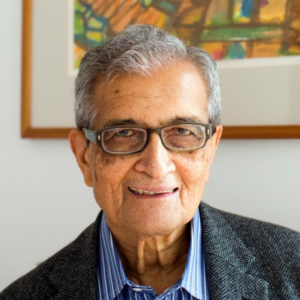Amartya Sen is Thomas W. Lamont University Professor, and Professor of Economics and Philosophy, at Harvard University. Until recently he was the Master of Trinity College, Cambridge University (1998-2004)—the first Indian Academic to head an Oxbridge college. His contributions to welfare economics range from social choice theory, poverty and welfare indexes, distribution, the study of famine, individual welfare, and collective decision taking. He is a Past President of the Econometric Society, the Indian Economic Association, the American Economic Association, and the International Economic Association. He was formerly Honorary President of OXFAM and is now its Honorary Advisor. Born in Santiniketan, India, Amartya Sen studied at Presidency College in Calcutta, India, and at Trinity College, Cambridge. Prior posts include the Drummond Professorship of Political Economy at Oxford University, and a Fellowship at All Souls College (he is now a Distinguished Fellow of All Souls). Prior to that he was Professor of Economics at Delhi University and at the London School of Economics.
Dr. Sen’s research in social choice theory has elucidated the circumstances of collective decision making. His construction of welfare and poverty indexes has enhanced the understanding of poverty, inequality, unemployment, and the underlying economics behind famine. This led to his Nobel Memorial Prize in Economics in 1998. His work has provided a critical perspective on rational choice and cost-benefit analysis, and he has advanced development economics and the analysis of the choice of technology.
Dr. Sen’s Collective Choice and Social Welfare (1970) renewed interest in welfare issues, and his Poverty and Famine: An Essay on Entitlement and Deprivation(1981) analyzed famine, challenging the view that food shortage was the principal cause of famine and illustrating the causal effect of other social and economic factors in its creation. Other publications include On Economic Inequality (1973),Choice, Welfare and Measurement (1982), Resources, Values and Development(1984), Development as Freedom (1999), and Rationality and Freedom (2002),The Argumentative Indian (2005), and Identity and Violence: The Illusion of Destiny(2006). His most recent book, The Idea of Justice (2009), suggests that tough social issues such as malnourishment must be analyzed in terms of justice. In addition to his many scholarly articles, his books have been translated into more than 30 languages. Dr. Sen’s research has ranged over a number of fields in economics, philosophy, and decision theory, including social choice theory, welfare economics, theory of measurement, development economics, public health, gender studies, moral and political philosophy, and the economics of peace and war.
Dr. Sen has received over 80 honorary doctorates from major universities in North America, Europe, Asia and Africa. He is a Fellow of the British Academy, Foreign Honorary Member of the American Academy of Arts and Sciences, and a member of the American Philosophical Society. Among the awards he has received are the “Bharat Ratna” (the highest honour awarded by the President of India); the Senator Giovanni Agnelli International Prize in Ethics; the Alan Shawn Feinstein World Hunger Award; the Edinburgh Medal; the Brazilian Ordem do Merito Cientifico (Grã-Cruz); the Presidency of the Italian Republic Medal; the Eisenhower Medal; Honorary Companion of Honour (U.K.); and The George E. Marshall Award. In 2010 Time magazine listed him as one of their 100 most influential people in the world.

